 In recent days, especially since the assault on the Capitol on January 6, and on the occasion of the inauguration of Joe Biden as the new President of the United States, the media worldwide have had their eyes on the American country. This gives an image of the importance that the American political context has for the planet. It raises as many passions as national politics, giving rise to the same confrontations between people with different and antagonistic society visions.
In recent days, especially since the assault on the Capitol on January 6, and on the occasion of the inauguration of Joe Biden as the new President of the United States, the media worldwide have had their eyes on the American country. This gives an image of the importance that the American political context has for the planet. It raises as many passions as national politics, giving rise to the same confrontations between people with different and antagonistic society visions.
Among the many lessons that have been left to us these days, some stand out in terms of manner. First, it is striking how not a few international journalists and analysts have become dedicated activists, whose lives seemed to depend on the election result.
It was enough to see his expressions and reactions so incredibly visceral and far from the slightest rigor and objectivity. Passion has dominated even those who boast extensive American affairs experience (others, curiously, have never been to the United States, even on a brief vacation).
This has been compounded by the media, which, in the vast majority of cases, has just repeated the same mantra in a crushing way since it became known that Biden was going to be the candidate for the Democratic Party: "Trump bad; Biden good."
Without providing solid arguments, and without even knowing for sure what the new President's drift will be, we have witnessed constant television gatherings in which single-profile commentators were brought in, all saying the same slogans, without anyone daring to step outside the imposed majority script. And here we must include from public media to others who presume objectivity -and even independence-.
This aspect should not surprise us too much, since, for the last five years, when Donald Trump ran for President, there has been a constant and merciless media campaign of attack and discredit against the Republican leader, who has been harassed without mercy - sometimes with reason, since he has made mistakes, and many, like any politician with high responsibilities.
But no U.S. president or candidate has been pressured in the media like Trump. Not even others who have committed significant outrages. Suffice it to recall Clinton's sexual excesses. Or a Bush who led his country - and dragged others - into a war in Iraq based on blatant lies (the consequences of which are still being suffered in the Middle East and elsewhere), maintained secret CIA prisons halfway around the world, condoned the torture of detainees and allowed the shame of Guantánamo, and yet was re-elected to the post. Not to mention Obama's wiretapping of some of Europe's top leaders.
 This embarrassing media manipulation, designed and masterfully applied, has led European countries' citizens to consider Trump, by a majority (according to some surveys, up to 90%), little less than a dictator, a mentally deranged person, and a despicable being.
This embarrassing media manipulation, designed and masterfully applied, has led European countries' citizens to consider Trump, by a majority (according to some surveys, up to 90%), little less than a dictator, a mentally deranged person, and a despicable being.
All this is the result of the power that the press continues to hold -it is not in vain that it is called the Fourth Power- and the new one that has emerged in social networks -which I call the Fifth Power, which has even surpassed that of the traditional media, at least in some aspects-.
Whoever has the key that controls these means has a capacity of influence that either creates or destroys personalities, puts or removes governments, even in the country that remains the most powerful on the planet.
Although it is feared that there are still moments of tension to be lived concerning these last events, since, for the moment, the waters of psychological manipulation seem to return to their course, it is time to try to make a deep reflection. An assessment has been almost impossible in the past, given the high degree of passion in society.
An atmosphere so rarefied that anything said not corresponding to the imposed line of thought was immediately stabbed through by the digital and media armies.
What have been the characteristics of Trump's mandate?
He has behaved like a businessman at all times, so he has led the country, applying a pragmatic policy, devoid of idealism, with a tremendous economic background.
He has carried out a neoconservative policy, confronted with ultra-liberalism, which has upset many who could not allow an outsider, a person without significant political experience, to take away the prominence that has cost them so much time, effort, and money to implement in the United States and half the world.
There is no doubt that Trump has applied the "madman's strategy" to impress, threaten and placate adversaries and partners and allies. At times, it has worked for him, but it has ended up hurting him on more than a few occasions. His sad end, abandoned by all - rats are known to jump off the sinking ship early - is, in a way, a consequence of this risky strategy.
Their communication plan has been based mostly on the use of Twitter. Not that Obama hasn't also used it, but certainly not with the same profusion as Trump. In fact, he has made what is called "politics by tweeting" fashionable, now imitated by most politicians.
In addition to understanding the current meaning of social networks in the digital era, perhaps it was also due to his mistrust of traditional media, as time has proven to be right. Likewise, he has known how to make intelligent use of neuro-communication, of his voters' psychological motivation.
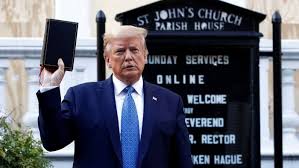 He has shown himself to be a great social manipulator, knowing at all times how to say the right words - in many cases excessive and more than questionable and reprehensible - to make the front page of newspapers and open the news. Not in vain had he been for a decade director and presenter of a reality show.
He has shown himself to be a great social manipulator, knowing at all times how to say the right words - in many cases excessive and more than questionable and reprehensible - to make the front page of newspapers and open the news. Not in vain had he been for a decade director and presenter of a reality show.
On Twitter, he had 90 million followers, with whom he communicated through his permanent tweets, to which he returned practically addicted, eager for the next dose of messages. But he also used the network in a bureaucratic way, appointing and dismissing officials and advisors.
But perhaps the most relevant feature has been the constant mobilization of the entire American political establishment to get rid of it. They have tried by all means. In addition to the aforementioned overwhelming media campaign, it has suffered all kinds of political attacks.
To begin with, the "Russiagate." Following the interception and recording of the telephone call to the Prime Minister of Ukraine and that made to the Secretary of State of Georgia (it should be very shocking to us that the President of the first world power can have his communications intercepted so easily).
Then, the constant street demonstrations in almost all over the country because of racial, feminist, or pro-abortion issues (clearly encouraged and financed by ultra-progressive people and entities).
And all this with constant disqualifications of his management of the coronavirus (although it is true that he has committed excesses and defects very worthy of criticism, it is no less accurate that the situation has been magnified; suffice it to say that last January 20, when Biden took office, six European countries had worse data of deaths from the pandemic concerning the number of inhabitants).
Personally, his character has left no one indifferent. For some, a true leader, the conductor, with an overwhelming personality. The leader that a sector of the Republicans, who felt like orphans, was waiting for.
For many others, he was just a proud, arrogant, smug, presumptuous person, lacking in empathy, without the slightest hint of humility, bizarre, theatrical, and histrionic that he did not deserve, that he was given the least attention. For the latter, his appearance as a schoolyard bully made him look bad. In short, Trump was loved or hated; few were left indifferent.
But this very prominent and unusual personality in the political arena also had its advantages: it was transparent and direct, without dissimulation or bending.
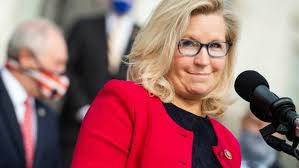 Who was against Trump?
Who was against Trump?
From the beginning, and as an outsider in politics, Trump earned the deadly enmity of the most powerful factions in the U.S. and much of the world. Those used to pulling the strings of power couldn't allow someone like him to come along and make amends, let alone interfere with their interests, business, and plans for society.
Thus, they were turned against him by the influential American establishment and the large groups of investors. From the Council on Foreign Relations, from which the people who have led the country since its creation a century ago have usually emerged - in Europe, it has its ramification in the European Council on Foreign Relations - to the majority of Freemasonry, especially the Anglo-Saxon liberal and globalist vocation.
Not to mention the powerful ultra-progressives who seek, by making social architecture, to modify societies as they please, imposing fashions, rites, and customs on all aspects of life.
As if that weren't enough, he was also always tripped up by members of the "interventionist" wing of the Republican Party, who longed for new military adventures, which Trump always refused.
A case in point is Liz Cheney, the third Republican in the House of Representatives and leader of the Congressional Republican revolt against Donald Trump. She is the daughter of Dick Cheney, who was the 46th Vice President of the United States (from January 20, 2001, to January 20, 2009), and, after being Secretary of Defense during the presidency of George H.W. Bush, was CEO of Halliburton, the powerful hydrocarbon multinational.
Following in the footsteps of her father, who supported Iraq's invasion in 2003, Liz Cheney has maintained permanent confrontations with Trump for being against withdrawing forces from abroad and advocating a strong foreign and military policy.
Nor can we ignore the powerful defense industry lobby, for whom Trump's neo-isolationism was not at all beneficial to their business.
In short, it has had against it the masters of most of the economy and finance, the media, the press agencies, the digital platforms, and the organs of power in the world.
Against them, Trump, unavailable to discouragement, has tried to fight them tooth and nail. But in the end, he has proved himself too powerful an outfit to succeed in bringing them down. One could say that he positioned himself as a "sovereignist," to the anger of the "globalists," who never forgave him and swore to end his political career.
What is Trump accused of?
Without a doubt, Trump made many mistakes. Sometimes, not unlike those made by other presidents, but with one big difference: they were evident, and not infrequently, he angered them himself. To put it another way, while Obama, without going any further, was one of those who threw the stone and hid his hand, Trump warned that he was going to throw the stone, he threw it hard, and on top of that, he bragged about it.
Let's look at the most questionable issues of his mandate. First, evident mismanagement of the Covid pandemic, and on top of that, gives very unfortunate advice. While we in Europe cannot criticize others too much, the truth is that he did it not okay, and therefore deserves to be reproached.
His abandonment of international organizations did not play in his favor either. On December 31, 2018, his exit from UNESCO (United Nations Educational, Scientific and Cultural Organization) became effective. The motivation was twofold: to promote policies favorable to gender ideology and to consider him anti-Israeli.
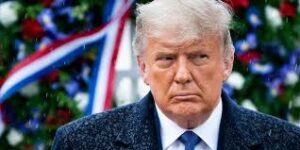 In this case, Israel supported it and also left the organization on the same date. Interestingly, what has not been aired in the media is that the U.S. had already stopped paying its contribution to UNESCO in 2011, with Barack Obama, when the organization accepted Palestine as a member. And years earlier, in 1984, with Ronald Reagan, Washington abandoned the organization, which it accused of "politicizing virtually every single issue under its jurisdiction.
In this case, Israel supported it and also left the organization on the same date. Interestingly, what has not been aired in the media is that the U.S. had already stopped paying its contribution to UNESCO in 2011, with Barack Obama, when the organization accepted Palestine as a member. And years earlier, in 1984, with Ronald Reagan, Washington abandoned the organization, which it accused of "politicizing virtually every single issue under its jurisdiction.
But the most striking and most critical thing that has cost him, on the part of governments, organizations, and climate influencers - such as Greta Thunberg - was the withdrawal of the Paris climate change agreement of 2015. Although, once again, the press has not mentioned that Obama did little, or just nothing, for climate change, since, on the contrary, he promoted fracking, hydraulic fracturing to obtain hydrocarbons.
Another issue for which it has been heavily criticized - and which Biden has promised to overturn - was the banning of six Muslim-majority countries in the Middle East and Africa (Syria, Iran, Libya, Yemen, Somalia, and Chad) from entering the U.S., in addition to limitations on immigration from North Korea and restrictions on Venezuelans close to Nicolas Maduro.
Here we forget that the Clinton Administration established a list of "rogue states," of which five were Muslim (Iran, Iraq, Syria, Libya, and Sudan). Two belonged to the group of socialist states: Cuba and North Korea.
Nor was everything so transparent. For example, in January 2018, Trump renewed the National Security Agency's (NSA) mass espionage program outside the United States for six years, following the line marked by his two predecessors in office.
Have Trump did anything right?
Although hidden or minimized by the mainstream media as part of their strategy to tear Trump apart, in an attempt to deny him any success during his tenure, the truth is that he didn't do everything wrong. For one thing, he is the only American President who has not started a war in almost a century.
In this same line, and following the Jacksonian doctrine, he has tried to end the wars in Afghanistan, Iraq, and Syria by withdrawing forces. Despite the evident tension, it has not attacked North Korea militarily; on the contrary, it achieved the meeting with the North Korean leader, Kin Jon-Un, on June 12, 2018, in Singapore.
Although he killed the powerful General Soleimani in January 2020, he has not conventionally attacked Iran.
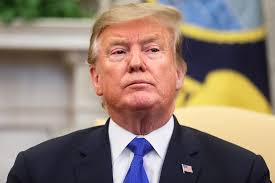 He gradually reduced U.S. bombing in the different conflict scenarios, from almost 50,000 bombs dropped in 2017 to just over 10,000 in 2019.
He gradually reduced U.S. bombing in the different conflict scenarios, from almost 50,000 bombs dropped in 2017 to just over 10,000 in 2019.
While geopolitical rivalry swords have remained high, he approached Russia, meeting with Putin in Helsinki on July 16, 2018. There was an ideological affinity between the two leaders since they are both on the neoconservative side and share ultra-progressive enemies.
Perhaps, as a result, Trump, and unlike Obama, I have not pressured Putin on the Crimean issue. The main difference has been in the gas pipelines, specifically North Stream 2, which connect Russia directly to Germany, which goes against U.S. energy and geopolitical interests.
As far as the economy is concerned, by 2018, it had already reduced unemployment to 4%, the lowest since 2000, and before the pandemic emerged, it had dropped to 3%, a figure never seen since 1960. It has substantially lowered taxes for businesses and individuals, increasing the exemption from filing returns from $12,500 to $24,400 for married couples.
And very importantly, it had managed to recover companies that had relocated. Meanwhile, the best median for the family economy since the Clinton Administration was achieved. Besides, he handed out checks for $1,200 to more than 125 million Americans during the pandemic.
These successful actions, coupled with determined action against ultra-liberal taxation, led to 73 million votes in the last election, 10 million more than in 2016.
Did Trump keep his election promises?
We could say yes to most of them, something that is already quite rare among politicians, who have us accustomed to not complying with them in almost all of them.
Let's see what he accomplished. Concerning Iraq, he criticized the 2003 invasion and promised to withdraw his forces.
In Russia, he understood that Crimea's annexation was only a problem of the Europeans, so he implicitly accepted it.
He promised not to intervene in any international crisis that would not directly affect his citizens because he believes that the U.S. has been ruined by defending other countries' interests. His idea was to focus more on his own country and its real interests (Jacksonian doctrine).
On NATO, he believed that, despite the substantial contribution of the U.S. to the organization (more than 70% of the budget), the other allies benefit from the security it provides. He went so far as to say that he would not defend a NATO ally (in principle mandatory according to Article 5 of the Founding Charter) that did not comply with the economic commitment. This commitment made by NATO members implies contributing at least 2% of their GDP to the organization.
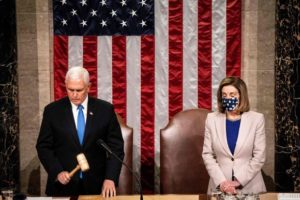 The reality is that the average for European countries is 1.5%, with extreme cases such as Luxembourg (0.4%), Spain (0.9%), or Belgium (0.91%). The truth is that this has been a demand of all U.S. presidents since the end of the USSR. Obviously, the U.S. would not abandon its NATO partners since this organization serves as a geostrategic lever.
The reality is that the average for European countries is 1.5%, with extreme cases such as Luxembourg (0.4%), Spain (0.9%), or Belgium (0.91%). The truth is that this has been a demand of all U.S. presidents since the end of the USSR. Obviously, the U.S. would not abandon its NATO partners since this organization serves as a geostrategic lever.
As for Syria, its purpose was to focus on defeating the Islamic State and not on driving Al Assad from power, which is considered a lesser evil. Unlike Obama and Hillary Clinton, he thought it was a significant risk to support rebels whose ideology and objectives are not precisely known so that Al Assad could be replaced by something much worse.
He guaranteed Israel strong support, with promises of more significant commitment than Obama. On the other hand, Obama was very skeptical of a "two-state" solution to the Israeli-Palestinian conflict and opposed to any UN-sponsored peace plan with the Palestinians. He promised to recognize Jerusalem as the capital of Israel and move the U.S. embassy there, which he did in December 2017.
In this sense, he achieved the historic milestone of the so-called Abraham Agreements, by which the United Arab Emirates, Bahrain, Sudan, and Morocco recognized the State of Israel, thus putting an end, at least partially, to the Arab-Israeli confrontation, which had lasted for decades. There is no doubt that any other president, without so many enemies, would have been awarded the Nobel Peace Prize, and with much more judgment than Obama.
What is striking in this regard is that, despite the many significant gestures made by Trump for the benefit of Israel and the Jews, they did not ultimately support him strongly and explicitly, he no doubt expected. It should be noted that it is estimated that 80% of American Jews (almost half of the world's Jews) are Democrats, so Trump's measures were also aimed at garnering their unconditional support.
He promised to reduce the military presence for Afghanistan unless it became a national security problem again.
In Cuba's case, which he had between his eyes, he expressed himself in the sense of pressuring Raúl Castro to leave power. Shortly before the end of his term, on January 17, 2012, he put Cuba back on the list of countries sponsoring terrorism.
On Iran, he denounced the nuclear agreement, for considering it a deception on the part of Teheran, the only party that would have benefited from it, since Obama had rushed it for personal political interest. His idea was to revise it.
He gave China his attention, considering it the main geopolitical and economic threat to the United States. He promised to review the trade agreements with Beijing as he considered them a marked advantage for this country, which he also accused of benefiting from the relocation of U.S. companies, manipulating the currency, and stealing intellectual property.
He threatened to increase tariffs on Chinese products and advocated reducing the $320 billion trade deficit (by 2015) in favor of China. Geostrategically, its purpose was to prevent the expansion of Chinese sovereignty in the South China Sea from posing a threat to U.S. influence in the region.
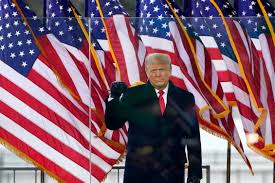 And what promises did he not keep?
And what promises did he not keep?
Since he assured that the U.S. had spent a lot of money and lives overthrowing Saddam Hussein, he promised to pass the bill on to Baghdad, from which he asked for $15 billion in compensation, even threatening to take over the oil fields by force. He also pledged to employ tens of thousands of troops on the ground in Iraq against the Islamic State.
He sentenced Mexico to build a large border wall, which would be paid for by Mexico itself. He threatened to seize remittances sent by immigrants living in the U.S. to their Mexican families. It also threatened to deport 5.6 million undocumented immigrants and to impose a 35% tariff on Mexican exports to the U.S.
The truth is that, of the 2,000 miles of border between the U.S. and Mexico, 1,000 were already blocked with walls, fences, or barriers when Trump became President.
The rest is practically impossible to build because it is private land, because of the Rio Grande or other orographic difficulties. The wall with Mexico was started in California in 1993, with Bill Clinton (operation Guardian). And another in Texas in 1997. Most of it is a fence, so it was mainly possible to raise and reinforce the wall rather than create an entirely new one.
Likewise, he promised to dismantle the North American Free Trade Agreement (NAFTA) due to economic claudication. The reality is that a new free trade agreement between the United States, Mexico, and Canada was agreed upon.
As for South Korea, Trump threatened to pay for the nearly 30,000 U.S. soldiers stationed in the country because he understood that they were only protecting South Korea's interests against the North.
He defined NATO as an obsolete organization and spoke of removing and putting countries, without specifying which ones.
For Japan, he favored withdrawing the 50,000 military personnel deployed in Japan if Tokyo did not bear the costs. The truth is that Japan was already paying 75% of the price of the 50,000 Americans deployed in its territory, some 1.9 billion dollars a year. Moreover, it is an essential ally within the strategic encirclement of China.
Article published at www.elliberal.com and reproduced with permission of the author